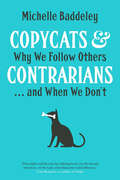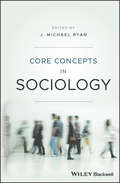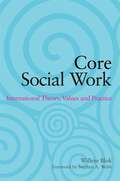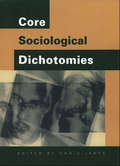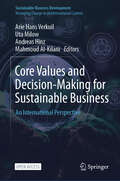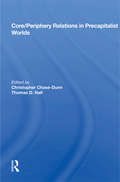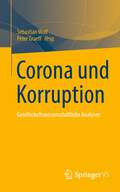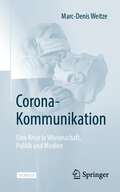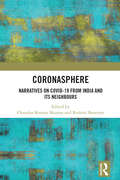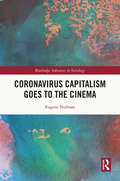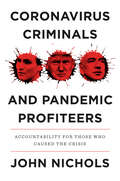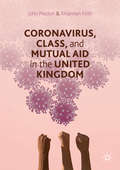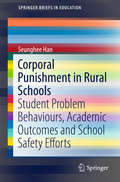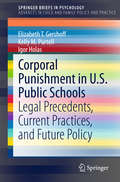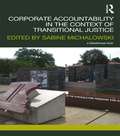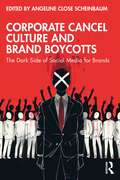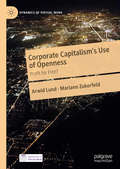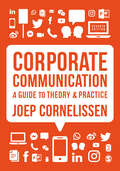- Table View
- List View
Copy, Copy, Copy
by Mark Earls John V. WillshireTHE #1 HACK FOR SMARTER MARKETINGWe all want new answers and new solutions for the very real and pressing challenges that our organizations face. New things to point to and talk about, new ways of working and new ways of thinking that might just be better than the old ways. But rather than this endless search for a brilliant and novel solution, why don't you just copy something that's worked before? Mark Earls, leading expert in marketing and consumer behaviour, quashes the stigma around copying, and shows that it can help us to rethink how we go about solving problems. By understanding what other people are doing and the choices they make, we can develop strategies to solve the challenges that we face inside and outside the organization.Based on extensive research and proven examples, Copy, Copy, Copy provides over 50 strategies that you can use right away to copy, borrow or steal as the basis for better ideas - faster. If it's good enough for Elvis, Newton, Shakespeare, The British Olympic Cycling Team and Great Ormond Street Hospital, isn't it good enough for you? 'This delightful book argues convincingly that transferring ideas usually produces greater value than cooking them up from scratch. And then shows you how.' -- Rory Sutherland, Vice Chairman, Ogilvy London and the Spectator Magazine's Wikiman 'Yet another entertaining handbook from the acclaimed Herdmeister for anyone involved in marketing, behavioural change and understanding why we all make the choices we make. Earls convincingly disrupts convention about what is innovation - though "praxis". This is jammed with great case studies and 52 actionable strategies.' -- Stephen Maher, Chairman, The Marketing Society and CEO, MBA 'Yet again this leading British business thinker has got us to see the world we inhabit today in fresh and mind-altering ways. A book which marries theory and practice better than the vast majority out there. Most of all his message of copying one's way to greatness is entertaining, counter-intuitive and fun.' -- David Abraham, CEO Channel 4 PLC
Copycats & Contrarians: Why We Follow Others . . . and When We Don't
by Michelle Baddeley&“Why we run with—or avoid—the crowd, and why it matters, from choosing a restaurant in a tourist trap to believing fake news. I learned a lot&” (Tim Harford, author of The Undercover Economist). Rioting teenagers, tumbling stock markets, and the spread of religious terrorism appear to have little in common, but all are driven by the same basic instincts: the tendency to herd, follow, and imitate others. In today&’s interconnected world, group choices all too often seem maladaptive. With unprecedented speed, information—or misinformation—flashes across the globe and drives rapid shifts in group opinion. Adverse results can include speculative economic bubbles, irrational denigration of scientists and other experts, seismic political reversals, and more. Drawing on insights from across the social, behavioral, and natural sciences, Michelle Baddeley explores contexts in which behavior is driven by the herd. She analyzes the rational vs. nonrational and cognitive vs. emotional forces involved, and she investigates why herding only sometimes works out well. With new perspectives on followers, leaders, and the pros and cons of herd behavior, Baddeley shines vivid light on human behavior in the context of our ever-more-connected world. &“Her observations on how both risk-taking and conformism contributed to Donald Trump&’s election, and on how social media affects &‘copycats,&’ make for a well-timed and valuable study.&” —Publishers Weekly &“This might well become the defining book, for this decade and more, on the topic of herding and social influence.&” —Cass Sunstein, co-author of Nudge
Core Concepts in Sociology
by J. Michael RyanAn essential guide to the basic concepts that comprise the study of sociology with contributions from an international range of leading experts Core Concepts in Sociology is a comprehensive guide to the essential concepts relevant to the current study of the discipline and wider social science. The contributing authors cover a wide range of concepts that remain at the heart of sociology including those from its academic founding and others much more recent in their development. The text contains contributions from an international panel of leading figures in the field, utilizing their expertise on core concepts and presenting an accessible introduction for students. Drawing on the widest range of ideas, research, current literature and expert assessment, Core Concepts in Sociology contains over 90 concepts that represent the discipline. Coverage includes concepts ranging from aging to capitalism, democracy to economic sociology, epistemology to everyday life, media to risk, stigma and much more. This vital resource: Sets out the concepts that underpin the study of sociology and wider social science Contains contributions from an international panel of leading figures in the field Includes a comprehensive review of the basic concepts that comprise the foundation and essential development of the discipline Designed as a concise and accessible resource Written for students, researchers and wider professionals with an interest in the field of sociology, Core Concepts in Sociology offers a concise, affordable and accessible resource for studying the underpinnings of sociology and social science.
Core Social Work
by Willem BlokIt is important for practising and trainee social workers to have a full understanding of the work they do and its role in society. This book provides an introduction to 'the essentials' of social work. Written from an international perspective, the author details the core theory, values and practice which unite social workers around the world. He covers professional standards, social work education and training and social work structures, and outlines a vision of the future of social work: where it is now, and what needs to be done to protect its identity. This accessible text will be required reading for social work professionals and students.
Core Sociological Dichotomies (Social Theory Ser.)
by Chris JenksIn this sociology text the contributors provide an introduction to the subject without over-simplifying or `writing-down′ to their audience. The book aims to furnish undergraduates with the knowledge that will help them to understand and practice sociology and also to develop a self-perpetuating sociological imagination to enable them to think through new issues and new problems. It consists of a series of specially commissioned chapters around binary or dichotomous themes. Although many sociologists are critical of dichotomous models of sociological theory and research, the device crops up again and again in the history and practice of the subject. Jenks and his colleagues use the dichotomies to situate students in current sociological arguments and topical debates. For example, by examining contradictory pairs of concepts like structure/agency, local/global, continuity/change, students are introduced to alternative explanations for aspects of human conduct over a whole series of issues.
Core Values and Decision-Making for Sustainable Business: An International Perspective (Sustainable Business Development)
by Mahmoud Al-Kilani Arie Hans Verkuil Uta Milow Andreas HinzThis open access volume discusses the core values and decision-making for sustainable business in general, and includes research findings and country cases on addressing challenges. It emphasizes the importance of adapting products or services to local needs, considering cultural differences and sustainability. Some of the chapters address questions related to improving sustainability in micro, small and medium-sized enterprises (MSMEs), and cover circular economy and responsible consumption. Others look at the normative framework conditions for business development; sustainability in supply chains; the involvement of stakeholders and their influence on market presence; entrepreneurial decision-making for sustainability; and approaches to teaching international and sustainability-oriented entrepreneurship. The volume sheds light on the pivotal role MSMEs play in shaping a sustainable future and is written for researchers, practitioners, and students working on related topics.
Core-periphery Relations And Organisation Studies
by Gavin Jack Robert Westwood Farzad Rafi Khan Michal FrenkelCore-Periphery Relations and Organization Studies draws together postcolonial and indigenous thinking through the conceptual lens of core-periphery relations to advance debate in organization studies. A particular aim of this book is to broaden, deepen and critically reassert a postcolonial imagination in this domain.
Core/periphery Relations In Precapitalist Worlds
by Christopher Chase-Dunn Thomas D. HallThis book demonstrates that Immanuel Wallerstein's reluctance to apply core and periphery to precapitalist transformations is a product of the way he views the luxury trade. It utilizes the study of different kinds of world-systems to explore how logics of social reproduction become transformed.
Corona und Korruption: Gesellschaftswissenschaftliche Analysen
by Sebastian Wolf Peter GraeffDer Sammelband analysiert aus einer interdisziplinären Perspektive Auswirkungen der Corona-Pandemie auf Korruptionsformen, Korruptionsbekämpfung und Korruptionsforschung. So werden insbesondere spezifische Korruptionsgefahren durch die weitreichenden staatlichen Maßnahmen zur Eindämmung der Pandemie und ihrer Folgen in den Blick genommen. Theoretische und überblicksartige Erörterungen werden ergänzt durch empirische Fallstudien zu Brasilien und Deutschland. Ein Beitrag thematisiert Gemeinsamkeiten von COVID-19 und Korruption hinsichtlich der Erhebung von Umfragedaten. Der Band versammelt vor allem politikwissenschaftliche, soziologische und rechtswissenschaftliche Untersuchungen.
Corona und die anderen Wissenschaften: Interdisziplinäre Lehren aus der Pandemie (ars digitalis)
by Peter Klimczak Christer Petersen Denis NewiakDie Corona-Pandemie hat die gesamte Welt weitestgehend unvorbereitet getroffen, Entscheidungsträger*innen auf allen gesellschaftlichen Ebenen vor enorme Herausforderungen gestellt und ihnen schwerwiegende Entscheidungen unter weitestgehend unbekannten Voraussetzungen abverlangt. Gerade deswegen braucht es ein stärkeres Hinhören, was die anderen Wissenschaften, denen weniger Aufmerksamkeit zukam als etwa der Virologie, Epidemiologie, Pneumologie, zur Bewältigung beizutragen haben: Was können wir aus den vielfältigen Perspektiven der vielen anderen Wissenschaften zur Bewältigung der Corona-Krise und zukünftiger Pandemien lernen? Welche Erkenntnisse der vielen anderen Fächer wurden in den zurückliegenden Jahren und Monaten nicht ausreichend wahrgenommen und beherzigt? Welchen gesamtgesellschaftlichen Beitrag können diese Fächer zur Krisenbewältigung leisten und welche Voraussetzungen müssen dafür erfüllt sein?
Corona-Kommunikation: Eine Krise in Wissenschaft, Politik und Medien
by Marc-Denis WeitzeDie Beiträge der Wissenschaft in der Corona-Krise waren vielfältig. Sie reichten von der Impfstoffentwicklung über Aerosolforschung bis hin zu Modellierungen. Es gab viele Erfolgsmeldungen. Virologen wurden zu Medienstars. Wissenschaft, Politik und Medien sprachen zeitweise mit einer Stimme – ein Siegeszug der Wissenschaftskommunikation? Es gab aber auch überzogene Versprechungen, dünnhäutige Reaktionen bei Kritik und Einseitigkeit in der Politikberatung – ein kommunikatives Desaster für Wissenschaft, Politik und Medien?Dieses Sachbuch möchte die Diskussion zur Corona-Kommunikation in Wissenschaft, Politik und Medien anregen. Es basiert auf Fallstudien, die aus verschiedenen Perspektiven beleuchtet werden, ordnet Beispiele entlang der Kriterien etablierter Wissenschaftsorganisationen ein und formuliert Fragen an die künftige Wissenschaft und ihre Kommunikation.Ist dies eine Studie, Materialsammlung oder Streitschrift? Alles. Aber hauptsächlich ein Plädoyer: Gegen unantastbare Wahrheiten, Meinungshomogenisierung und Ausgrenzung. Für Transparenz, Pluralität und Dialog in Wissenschaft und Kommunikation.
Corona-Pandemie – die Folgen für die Arbeits- und die Alltagswelt (essentials)
by Irene RaehlmannDas essential thematisiert die Folgen der Corona-Pandemie für die Arbeits- und Alltagswelt. Im Kontext des aktuellen Leitbilds der Gestaltung von Arbeitsorganisationen werden folgende Bereiche der Lebenswelt behandelt: Das Homeoffice und das Homelearning sowie der Wandel der Öffentlichkeit. Das Fazit widmet sich den Folgen für das Wirtschaftssystem, den Problemen wissenschaftlicher Politikberatung, der Digitalisierung von Unterricht und Lehre sowie der Integration der Menschen, aber auch der Gesellschaft insgesamt.
Coronasphere: Narratives on COVID 19 from India and its Neighbours
by Reshmi Banerjee Chandan Kumar SharmaThis book presents a broad overview of the challenges posed by COVID-19 in India and its neighboring countries. It studies the differing responses to COVID-19 infections across South Asia, the variegated impact of the pandemic on its societies, communities and economies, and emerging challenges which require an interdisciplinary understanding and analysis. With a range of case studies from India, Bangladesh, Myanmar, Pakistan, Nepal, Bhutan, and Sri Lanka, this book, Analyses the socio-economic impact of the pandemic, including the structural challenges faced by farmers in the agricultural production and migrant workers in the informal sectors; Examines the shifting trends in migration and displacement during the pandemic; Explores the precarity faced by LGBTQ+, transgender, Dalit, tribal, senior citizens, and other marginalized communities during the pandemic; Discusses the gendered impact of the pandemic on women and girls, combining with multiple and intersecting inequalities like race, ethnicity, socio-economic status, age, geographical location, and sexual orientation; Sheds light on the position of health infrastructure and healthcare services across different countries, and the transitions experienced in their education sectors as well, in response to COVID-19. A holistic read on the pandemic, this book will be of interest to scholars and researchers of sociology, medical anthropology, sociology of health, pandemic and health studies, political studies, social anthropology, public policy, and South Asian studies.
Coronavirus Capitalism Goes to the Cinema (Routledge Advances in Sociology)
by Eugene NulmanUsing innovative interpretations of recent big budget films, Coronavirus Capitalism Goes to the Cinema interrogates the social, political and economic landscape during and prior to the COVID-19 crisis and provides lessons for advancing progressive politics in a post-pandemic age. By exploring numerous films including Avengers: Endgame, Once Upon a Time… In Hollywood, 1917, and Parasite, this short book provides a deep understanding about neoliberal society in a time of crisis. Facilitated by the ideas of Emma Goldman, Naomi Klein, Karl Marx, Noam Chomsky and many more, these movies are reinterpreted to point out our political blind spots, combat our non-COVID contagions and inoculate us into ideological herd immunity. From explorations of the supervillain-like decision-making of our political leaders to the inequalities in infection outcomes that sparked further Black Lives Matter protests, this book discusses the central social challenges we face today through the sights and sounds of some of the most beloved films of the very recent past. This entertaining and accessible book will reward readers who are interested in contemporary politics in the context of COVID-19, as well as cinephiles and movie-goers who want fresh interpretations of instant classics to help explain the world around them. More than just informative and amusing, this book is a call to action to those activists who want social change in the face of coronavirus capitalism.
Coronavirus Criminals and Pandemic Profiteers: Accountability for Those Who Caused the Crisis
by John NicholsA furious denunciation of America&’s coronavirus criminalsHundreds of thousands of deaths were caused not by the vicissitudes of nature but by the callous and opportunistic decisions of powerful people, as revealed here by John Nichols. On March 10, 2020, president Donald Trump told a nation worried about a novel coronavirus, &“We&’re prepared, and we&’re doing a great job with it. And it will go away. Just stay calm. It will go away.&” It has since been estimated that had Trump simply taken the same steps as other G7 countries, 40 percent fewer Americans would have died. And it was not just the president. His inner circle, including Mike Pence and Jared Kushner, downplayed the crisis and mishandled the response. Cabinet members such as Betsy DeVos and Mike Pompeo undermined public safety at home and abroad to advance their agendas. Senators Ron Johnson and Mitch McConnell, governors Kristi Noem and Andrew Cuomo, judges such as Wisconsin Supreme Court justice Rebecca Bradley all promulgated public policies that led to suffering and death. Meanwhile, profiteer Pfizer (and anti-government propagandists such as Grover Norquist) fed at the public trough, while the billionaire Jeff Bezos added pandemic profits to a grotesquely bloated fortune. John Nichols closes with a call for a version of the Pecora Commission, which took aim at what Franklin Delano Roosevelt called the &“speculation, reckless banking, class antagonism, and profiteering&” that stoked the Depression. There must be accountability.
Coronavirus, Class and Mutual Aid in the United Kingdom
by John Preston Rhiannon FirthThis book considers how the UK government’s response to the recent COVID-19 pandemic disadvantages the working class, and how mutual aid, based on anarchist principles, can be used as a force for social change. The authors draw on Marxist and anarchist thought in class theory and social movement analysis to demonstrate that the virus and its material and discursive consequences are an active part of continuing class struggle and class interpolation. Preston and Firth examine how plans for quarantine and social isolation systematically work against the needs of the working class, and rely on classed assumptions about how markets and altruism operate. In the face of neoliberal methods of dealing with a pandemic, ranging from marketization, disaster capitalism, to a strengthening of the State, Coronavirus, Class and Mutual Aid in the United Kingdom explains how radical alternatives such as social movements and mutual aid can be implemented to better cope with current and future crises.
Corporal Punishment in Rural Schools: Student Problem Behaviours, Academic Outcomes and School Safety Efforts (SpringerBriefs in Education)
by Seunghee HanThis book presents an analysis of corporal punishment practices in rural schools. It examines trends in corporal punishment at rural schools for school years from 1999-2000, 2003-2004, 2005-2006 and 2007-2008, multiple stakeholders perspectives on corporal punishment (e. g. , school staff, student and parents), and various school-specific factors including alternative discipline practices, school safety efforts, problematic student behaviours, and academic outcomes. In addition to drawing attention to the issue of corporal punishment in rural schools, it equips readers with an in-depth understanding of these practices. "
Corporal Punishment in U.S. Public Schools: Legal Precedents, Current Practices, and Future Policy (SpringerBriefs in Psychology)
by Elizabeth T. Gershoff Kelly M. Purtell Igor HolasThis Brief reviews the past, present, and future use of school corporal punishment in the United States, a practice that remains legal in 19 states as it is constitutionally permitted according to the U. S. Supreme Court. As a result of school corporal punishment, nearly 200,000 children are paddled in schools each year. Most Americans are unaware of this fact or the physical injuries sustained by countless school children who are hit with objects by school personnel in the name of discipline. Therefore, Corporal Punishment in U. S. Public Schools begins by summarizing the legal basis for school corporal punishment and trends in Americans' attitudes about it. It then presents trends in the use of school corporal punishment in the United States over time to establish its past and current prevalence. It then discusses what is known about the effects of school corporal punishment on children, though with so little research on this topic, much of the relevant literature is focused on parents' use of corporal punishment with their children. It also provides results from a policy analysis that examines the effect of state-level school corporal punishment bans on trends in juvenile crime. It concludes by discussing potential legal, policy, and advocacy avenues for abolition of school corporal punishment at the state and federal levels as well as summarizing how school corporal punishment is being used and what its potential implications are for thousands of individual students and for the society at large. As school corporal punishment becomes more and more regulated at the state level, Corporal Punishment in U. S. Public Schools serves an essential guide for policymakers and advocates across the country as well as for researchers, scientist-practitioners, and graduate students.
Corporal Punishment, Religion, and United States Public Schools
by Jane Hall Fitz-GibbonThis book examines corporal punishment in United States public schools. The practice--which is still legal in nineteen states--affects approximately a quarter million children each year. Justification for the use of physical punishment is often based on religious texts. Rather than simply disregarding the importance of religious commitment, this volume presents an alternative faith-based response. The book suggests the "hermeneutical triad," of sacred text, tradition, and reason as an acceptable approach for those seeking to be faithful to religious text and tradition.
Corporate Accountability in the Context of Transitional Justice
by Sabine MichalowskiCorporate Accountability in the Context of Transitional Justice explores how corporations can be held accountable for their role in past human rights violations when a country is making a transition from conflict or repression to peace and democracy. It breaks new ground in theorizing the linkages between the areas of transitional justice and corporate accountability and analyzing problems frequently arising where the two fields meet in practice, for example where the role of corporations in past human rights violations is examined by truth and reconciliation commissions or in the course of litigation. The book provides an overview of the current trends in law and in legal and political discussion relating to both areas, as well as in-depth analysis of how tools of corporate accountability and transitional justice can complement each other in order to achieve the best outcomes for bringing justice to victims and lasting peace to societies. The authors bring extensive experience from diverse professional backgrounds and jurisdictions to provide the first sustained attempt to address this link. The book will be of interest to scholars, practitioners, policymakers and activists working in the areas of transitional justice; corporate accountability; and business and human rights.
Corporate Cancel Culture and Brand Boycotts: The Dark Side of Social Media for Brands
by Angeline Close ScheinbaumThis topical book examines and tests the complexities of unintended consequences of social media that often impact brands and companies from both an economic and a reputational lens. This book introduces the term “corporate cancel culture,” highlighting the growing trend among customers to leverage social media to communicate their grievances with companies. This book reports challenges of social media platforms to brands and companies. The challenges addressed entail including social media trolls, the power of influencers, the dark web, cancel culture in sports due to political constraints, social media influencer livestreams, and misinformation. Written by a team of experts from North America, Europe, South America, and Asia, this book showcases real‑world expertise in marketing, branding, consumer psychology, economics, and communication. This book also considers solutions for brands and companies who need to address the dark side of social media by offering insights on fostering accountability among brands and business leaders and providing a roadmap to mitigate consumer resistance.Corporate Cancel Culture and Brand Boycotts: The Dark Side of Social Media for Brands is a must read for students of psychology, marketing, public relations, management, and social media. It will also be of interest to users of social media – both consumers and business/organizations. It is especially valuable for marketing/advertising professionals, social media professionals/influencers, and business executives. It is designed to be read alongside The Dark Side of Social Media: A Consumer Psychology Perspective.
Corporate Capitalism's Use of Openness: Profit for Free? (Dynamics of Virtual Work)
by Arwid Lund Mariano ZukerfeldThis book tackles the concept of openness (as in open source software, open access and free culture), from a critical political economy perspective to consider its encroachment by capitalist corporations, but also how it advances radical alternatives to cognitive capitalism. Drawing on four case studies, Corporate Capitalism’s Use of Openness will add to discussion on open source software, open access content platforms, open access publishing, and open university courses. These otherwise disparate cases share two fundamental features: informational capitalist corporations base their successful business models on unpaid productive activities, play, attention, knowledge and labour, and do so crucially by resorting to ideological uses of concepts such as “openness”, “communities” and “sharing”. The authors present potential solutions and alternative regulations to counter these exploitative and alienating business models, and to foster digital knowledge commons, ranging from co-ops and commons-based peer production to state agencies' platforms. Their research and findings will appeal to students, academics and activists around the world in fields such as sociology, economy, media and communication, library and information science, political sciences and technology studies.
Corporate Character
by Eddy KentThe vastness of Britain's nineteenth-century empire and the gap between imperial policy and colonial practice demanded an institutional culture that encouraged British administrators to identify the interests of imperial service as their own. In Corporate Character, Eddy Kent examines novels, short stories, poems, essays, memoirs, private correspondence, and parliamentary speeches related to the East India Company and its effective successor, the Indian Civil Service, to explain the origins of this imperial ethos of "virtuous service."Exploring the appointment, training, and management of Britain's overseas agents alongside the writing of public intellectuals such as Edmund Burke, Thomas Malthus, Thomas Babington Macaulay, and J.S. Mill, Kent explains the origins of the discourse of "virtuous empire" as an example of corporate culture and explores its culmination in Anglo-Indian literature like Rudyard Kipling's Kim. Challenging narratives of British imperialism that focus exclusively on race or nation, Kent's book is the first to study how corporate ways of thinking and feeling influenced British imperial life.
Corporate Communication a Guide to Theory and Practice
by Joep Cornelissen`This is a comprehensive and scholarly analysis of corporate communications. It will offer students and practitioners alike a considerable aid to study and understanding which will stand the test of time in a fast changing business' - Ian Wright, Corporate Relations Director, Diageo Incorporating current thinking and developments in the field from both the academic and practitioner worlds, the Second Edition of this bestseller combines a comprehensive theoretical foundation with numerous practical examples. The Second Edition features: - New chapters on stakeholder management and communication, corporate identity, image and reputation, internal communications and change, media and investor relations and issues in crisis management - New case vignettes and cases of corporate communications in US and European companies - An integrated case (Toyota) at the end of the text connecting all the different themes of the book. Praise for the First Edition: `A welcome and important addition to the limited writing already available on corporate communication. The book focuses correctly on the strategic management perspective necessary for an understanding of this area. It will be of enormous help to practitioners and academics in their quest to understand what may well be the most important functional area for most corporations in the coming years' - Paul A Argenti, Professor of Management and Corporate Communication, The Tuck School of Business at Dartmouth, USA `This is the text that practitioners, academics, and students in corporate communications have been waiting for. The book is accessible, comprehensive and is well balanced in discussing both theoretical and practical perspectives upon corporate communications. It is simply a must-read for those who want to be at the cutting edge of corporate communications' - Phil Harris, Professor of Marketing, University of Otago and International Director of the European Centre for Public Affairs in Brussels
Corporate Communication: A Guide to Theory and Practice
by Joep P. CornelissenThis popular, market-leading textbook for corporate communication continues to be the authoritative and definitive textbook for students and educators. The text has been fully updated to include: • changes to the workplace in light of the Covid-19 pandemic and its impacts on employee communication via platforms such as Zoom and Microsoft Teams • the ongoing impacts of digital disruption and transformation on corporate communication at the advent of the ‘metaverse’ and alongside consideration of popular newer social media such as TikTok • the increasing focus on sustainability and the United Nations’ Sustainable Development Goals (SDGs); societal impact, purpose and corporate social responsibility; and the importance of social justice and inclusion within organizations and how these relate to organizational communication New case studies include Black Lives Matter (Starbucks); surveillance capitalism (Facebook); diversity and inclusion (Microsoft); and hybrid working (British Airways). This textbook is essential reading for communication courses including: corporate communication; organizational communication; management communication; strategic communication; and public relations. Joep Cornelissen is Professor of Corporate Communication and Management at Rotterdam School of Management, Erasmus University.

